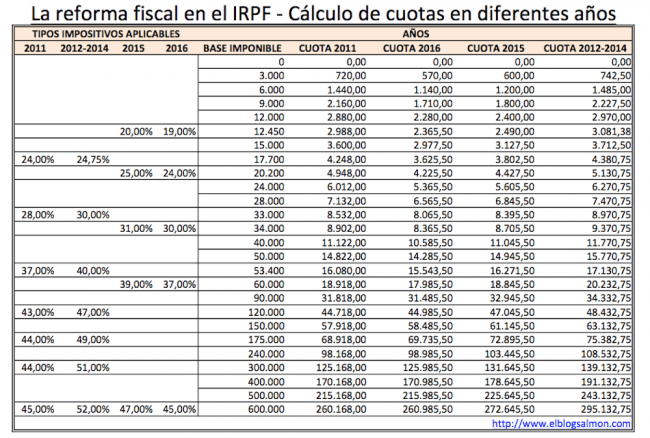Income tax for employees in Spain, although not directly relevant to freelancers (for whom this is a whole other story), is something lots of you come to this blog looking for, so today I thought I’d take the time to take a mini-diversion and write about it.
How much income tax do Spanish workers have to pay?
The closest Spain has to income tax is the IRPF, Impuesto Sobre la Renta de Personas Físicas or Tax on Earning of Physical People (as opposed to entities). As well as IRPF, employees in Spanish companies also pay, along with their employers, Social Seguridad (National Insurance Contributions).
The new Reforma Fiscal (Fiscal Reform) introduced in 2015 maps out changes to income tax levels in Spain in 2015-16. There are national elections in 2015, so in theory the new government could change income tax bands when they are elected, but in practice this would take too long to pass through and is unlikely.
The table at the bottom shows income tax rates as they will be over the next couple of years (full credit and many thanks to www.elblogsalmon.com for producing this). “Base imponible” refers to base yearly salary. As you can see, the main difference is that IRPF rates will be lowered – not just for those earning the lower wage brackets, but also those earning over €600,000 per year. So in real terms, while someone on a salary of €12,000 will have to pay €570 less in income tax in 2015 (presumably, the government expects that they will be able to use the extra money to buy some more logs to heat their hovel with), someone earning €600,000 will have to pay €22,487.25 less.
Photos and text by Penelope. Table showing tax rates by El Blog Salmón.

Hello Penelope,
I am completing my tax return in the UK and I need to include some income from Spain (Barcelona).
I have an end-of-year pay slip, where for income I have: “Sou Base” and “Complement Addicional” and their total. What corresponds to the UK’s “Total payment for the year” – only “Sou Base” or “Sou Base + Complement Addicional”?
If I use “Sou Base”, then the IRPF tax comes at 22.8% of my income. If I use the total, the IPRF is 15.6%. Both figures seem wrong, which should be either 24% or 30% for total income (looking at the IPRF rates for 2015 on Wikipedia under “Taxation_in_Spain”).
Under “Deductions” I also have “Quota Atur” (“unemployment”) and “Quota Contingències Comunes” (“common contingencies”). If I deduct those from “Sou Base”, then the tax I paid comes at 24.7% (about right). So should I report “Sou Base” minus these two deductions as my total pay for the year?
Some help would be greatly appreciated, as getting through to the accountancy department in the organization where few people speak English is a bit of challenge.
Thanks!
Hello Victor,
Normally, “base” is your base salary and “complement” refers to items like bonuses, Christmas payouts, etc. So your total gross (before tax) income for the year would be the sum of the two.
The company you work for then makes payments to the government for provision for items like unemployment, accident, illness, etc. These are taken off (deducted) along with any IRPF payments and so forth to provide your total net (after tax) income – what you finally receive in your bank account.
I’m not exactly sure, but of the two I’d say the UK government is more likely to be interested in your net income, as this represents your real earnings.
I’m not an accountant so do check all this with your department – hopefully this gives you enough information to get a more robust answer out of them 😉
Thank you, Penelope.